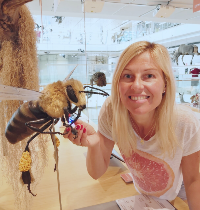
Elisa Frasnelli
 Associate professor
Associate professor
Department of Cellular, Computational and Integrative Biology - CIBIO
|
|
The role of the microbiota on locomotion, cognitive abilities, and health of the honey bee |
|
()
Thursday 11 January 2024
Recent studies on bees and fruit flies have shown how gut-brain communication is able to influence their behavior. This opens interesting questions about the importance, not only in humans but also in insects, of healthy gut-brain interaction to properly carry out behaviors necessary for their survival. Honey bees are critical to the alpine ecosystem, but various stressors (e.g., pesticides, parasites, climate change) have challenged their survival. The project will explore another possible way in which the environment (through changes in the microbiota due to stressors, nutrient availability, and antibiotic treatments) can influence honey bee behavior and cognition. The study will focus on the role of the gut microbiota on locomotion and cognition. Previous work on fruit flies has shown that the absence of a gut microbiome affects host locomotion by causing the host to be hyperactive. Here we will study whether this effect can also be observed in bees and whether it can also influence their learning, with obvious crucial implications for their health and survival. The project, through manipulation of the bees' gut microbiome (monocolonization of the gut with specific bacteria such as Bartonella, Bifidobacterium and Lactobacillus), will also identify which bacteria are responsible for behavioral changes and discover how to restore normal behavior and cognition. |
|
|
|
Lateralization |
|
()
Thursday 11 January 2024
The different functional specialization of the right and left hemisphere is a characteristic shared by many animal species, from humans to bees. Through behavioural and comparative cognition studies it is possible to investigate the features of this phenomenon to understand its function and evolution. |
|
|
|
Bees, Biodiversity and Climate Change |
|
()
Thursday 11 January 2024
Bees are vital to our ecosystem for their fundamental role as pollinators, but unfortunately they are increasingly subject to many environmental stressors. In particular, the impact of climate change on bee welfare is an issue that requires the urgent attention of the entire community. We need to understand the bee's neurobiology in more detail and study its interactions with the environment in order to promote beekeeping that is more resilient to such stressors.
|
|
|
|
Sentience and pain |
|
()
Thursday 11 January 2024
The traditional view that only vertebrates can feel pain is slowly fading. Invertebrates display complex behaviours and responses to stimuli, raising questions about their capacity to experience pain. Our research aims to provide behavioural and neuropharmacological evidence for their conscious pain. Understanding their experience could have implications for their conservation and ethical treatment. In addition, a greater awareness of invertebrate sentience could broaden our perspective on the nature of consciousness and pain in animals. |


